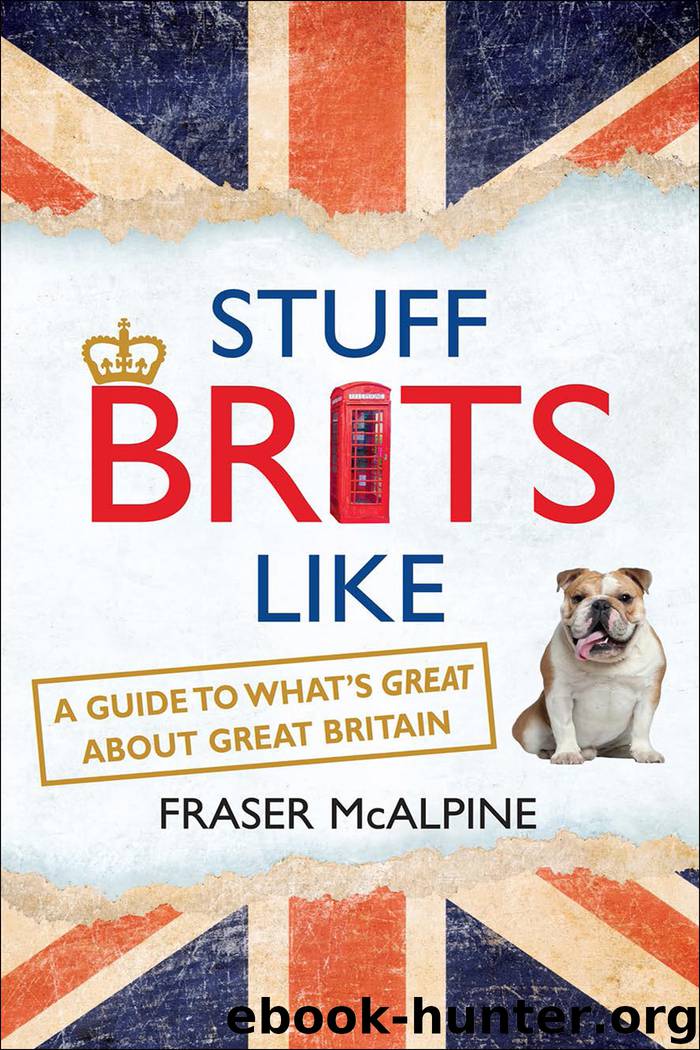Stuff Brits Like by Fraser McAlpine

Author:Fraser McAlpine
Language: eng
Format: epub
Publisher: Nicholas Brealey Publishing (FF)
Published: 2015-03-13T16:00:00+00:00
WHAT TO SAY: “Remember the year it rained and Cliff Richard led the crowd in a singsong?”
WHAT NOT TO SAY (ANY MORE): “Come on, Tim!”
Grade-B Swearwords
If you are of a gentle disposition, or prefer to believe that all British people, from St Ives to Inverness, are possessed of the kind of manners and decorum that would make Betty Crocker feel uncouth and dirty, this bit might be a little hard to take. However, the sad truth of the matter is that the British excel at swearing. And they’re proud of it too. Not only are all the best swearwords Anglo-Saxon in origin (something to do with those hard k’s and t’s and satisfying f’s and s’s) but there’s infinite expression in their delivery and use.
For example, there’s a world of difference between dropping a few choice expletives because the wind has caught your umbrella and wrecked it and calling someone an effing idiot because he or she pushed into the queue at the post office. You can use swearwords to add emphasis, to puncture pomposity and to win the heart of a fair maiden (albeit one with a robust sensibility, who has probably had more than enough of dealing with sodding dragons).
And that’s just if you’re using the kind of grade-A swearwords people understand all over the world, the ones live broadcasters have late-night fever dreams about, particularly when discussing a fracas in the Kentish countryside. Fortunately other words in circulation provide equally adaptable forms of obscenity, without once troubling foreign censors (although Ofcom would take a dimmer view).
One of the most expressive is bugger, a truly delightful word to say, especially now it has shaken off most of its judgmental provenance. Originally derived from an Old French word for “heretic”, bugger came to be synonymous with homosexual (one who commits buggery) in the sixteenth century, but took on an alternative meaning, denoting someone who deserves nothing but contempt or pity, in the eighteenth. Since then, the edges have become softened, and to be referred to as a bugger now is almost affectionate, in a gruff kind of way.
To be told to bugger off, while still a firm invitation to go away, comes from a similarly warm place. And nothing undercuts the drama of disappointing news like a well-placed, explosive “Bugger it!”
Oddly popular both in the postindustrial north of England and in the resolutely rural West Country, bugger is the kind of word that is best left out of polite conversation, but will seal a friendship in trying times.
The same cannot be said for the other British grade-B wondercuss: wanker.
Loaded with the same Anglo-Saxon weaponry as other, more famous swears, the W word denotes one act, and one act only, and that is masturbation. To refer to someone as a wanker is fighting talk. You’re not just suggesting he spends far too long enacting rituals of self-love, you’re saying he’s not fit to breed.
It is not a word the Brits tend to find charming or affectionate, unless used within a close circle of friends.
Download
This site does not store any files on its server. We only index and link to content provided by other sites. Please contact the content providers to delete copyright contents if any and email us, we'll remove relevant links or contents immediately.
| Contemporary | Dramas & Plays |
| Historical | Horror |
| Humor & Satire | Literature |
| Poetry | Shakespeare |
Still Me by Jojo Moyes(11239)
On the Yard (New York Review Books Classics) by Braly Malcolm(5519)
A Year in the Merde by Stephen Clarke(5396)
Eleanor Oliphant Is Completely Fine by Gail Honeyman(5252)
The Bookshop by Penelope Fitzgerald(3827)
How Music Works by David Byrne(3246)
Surprise Me by Kinsella Sophie(3103)
Pharaoh by Wilbur Smith(2984)
Why I Write by George Orwell(2933)
A Column of Fire by Ken Follett(2595)
Churchill by Paul Johnson(2564)
The Beach by Alex Garland(2549)
The Songlines by Bruce Chatwin(2538)
Aubrey–Maturin 02 - [1803-04] - Post Captain by Patrick O'Brian(2296)
Heartless by Mary Balogh(2249)
Elizabeth by Philippa Jones(2190)
Hitler by Ian Kershaw(2183)
Life of Elizabeth I by Alison Weir(2068)
Harry Potter and the Cursed Child by J. K. Rowling & John Tiffany & Jack Thorne(2052)
